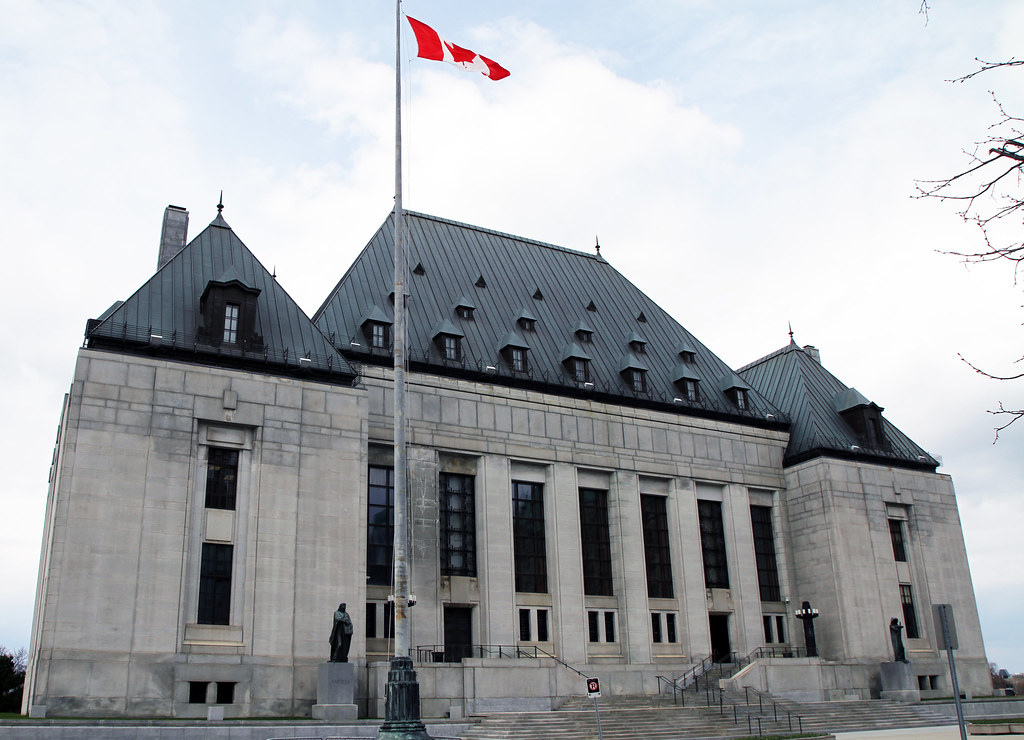Canadian National Security: Of Spies and Soleimani
The Canadian Supreme Court rules that a son of Russian spies is a Canadian citizen, and the killing of Qassem Soleimani—and the deaths of Canadian citizens aboard a jet downed by Iran—throws the country’s policy toward Iran and Iraq into question.

Published by The Lawfare Institute
in Cooperation With

Supreme Court Rules That Son of Russian Spies Is a Canadian Citizen
In December 2019, the Canadian Supreme Court rendered a judgment in the case of Canada (Minister of Citizenship and Immigration) v. Vavilov. The court simultaneously issued judgments in two other cases—one involving the telecommunications company Bell Canada and the other involving the National Football League (NFL). The Bell and NFL decisions arose out of the same administrative decision, while Vavilov arose out of an administrative decision by Immigration, Refugees and Citizenship Canada. The Bell-NFL-Vavilov trilogy, as Canadian lawyers refer to the three cases, represents a sea change in Canadian administrative law. Moreover, the court’s judgment in Vavilov could have national security repercussions.
The facts behind the Vavilov decision read like a John Grisham novel. Alexander Vavilov was born in Toronto in 1994 to Andrei Bezrukov and Elena Vavilova, both Russian spies working for Russia’s Foreign Intelligence Service (SVR). Vavilov’s parents posed “as Canadians under the assumed names of Tracey Lee Ann Foley and Donald Howard Heathfield.” His older brother, Timothy, was also born in Toronto. Shortly after Vavilov’s birth, the family moved to France and then to the United States. In 2010, the FBI arrested their parents as part of Operation Ghost Stories, which in total yielded the arrests of 10 undercover Russian agents. The 10 agents had been “betrayed by a Russian spy who defected to the Americans.” The United States government swapped the 10 Russian agents for four Russian nationals, held in Russian prison and accused of spying for the West.
The question before Canadian courts was whether or not Alexander Vavilov was entitled to Canadian citizenship. Section 3(2)(a) of the Canadian Citizenship Act exempts children of a “diplomatic or consular officer or other representative or employee in Canada of a foreign government” from the provision that persons born in Canada are automatically Canadian citizens. After his parents returned to Russia, Vavilov unsuccessfully attempted to renew his Canadian passport. He did, however, receive a certificate of Canadian citizenship in 2013. In 2014, the Registrar of Citizenship canceled the certificate, arguing that Section 3(2)(a) applied to Vavilov’s case and that his parents should be considered as representatives of a foreign government. The Federal Court, Canada’s national trial court that deals with legal disputes arising in the federal domain, dismissed Vavilov’s application for judicial review. The Federal Court of Appeal—the appellate court dealing with federal matters—allowed Vavilov’s appeal, however, and overturned the registrar’s decision. The minister of citizenship and immigration appealed the Federal Court of Appeal’s decision, and the Supreme Court heard the appeal.
The Supreme Court upheld the Federal Court of Appeal’s decision on a number of grounds. The court argued that persons contemplated by Section 3(2)(a) “must have been granted diplomatic privileges and immunities in some form for the exception to apply.” Since Vavilov’s parents had not been granted diplomatic privileges and immunities, Section 3(2)(a) did not apply to his case and the court held that Vavilov “is a Canadian citizen.” The court also argued that Section 3(2)(a) is a “narrow exception consistent with established principles of international law … that extend diplomatic privileges and immunities to employees … of foreign governments.”
The court’s decision has met with some criticism. Stephanie Carvin, a national security law expert, tweeted that the Supreme Court had just “granted a license to spy in Canada,” characterizing the court’s decision as “a navel-gazing decision devoid of any sense of reality.” Many more commentators, however, have focused on how Vavilov’s case, along with the Bell and NFL decisions, will remake Canadian administrative law.
Through the trilogy, the Supreme Court has modified its standard of review analysis as pertains to administrative law cases. The revised standard, as the court notes in Vavilov, “begins with a presumption that reasonableness is the applicable standard in all cases …. Where a legislature has not explicitly provided that a court is to have a more involved role in reviewing the decisions of that decision maker, it can safely be assumed that the legislature intended a minimum of judicial interference.” The reasonableness standard can be rebutted in “two types of situations”: when the legislature has “indicated that it intends a different standard to apply” or when certain types of legal questions are raised, such as constitutional questions or “general questions of law of central importance to the legal system.”
Fate of Canadian Military Operations in Iraq Uncertain Following U.S. Killing of Iranian General Qassem Soleimani
On Jan. 3, President Trump announced that the U.S. military had “successfully executed a flawless precision strike that killed” Iranian General Qassem Soleimani. Soleimani was the head of the Islamic Revolutionary Guard Corps Quds Force, a “special squad focused on overseas operations, among other intelligence missions.” A U.S. Department of Defense statement noted that “General Soleimani was actively developing plans to attack American diplomats and service members in Iraq and throughout the region.” Legal commentators slammed Trump’s decision as illegal under domestic and international law, with Oona Hathaway concluding that “it does not seem there was any imminent threat justifying unilateral action by the president.” Hathaway also notes that Trump ordered the strike without adequately consulting Congress.
Iran’s Ayatollah Ali Khamenei vowed “harsh revenge” on the United States. On Jan. 8, Iran launched more than a dozen missiles against “at least two Iraqi military bases hosting U.S. military and coalition personnel at Al-Assad and Irbil.” In the aftermath of the missile strikes, Iranian Foreign Minister Javad Zarif tweeted that Iran had taken “proportionate measures in self-defense under Article 51” of the UN Charter, noting that Iran was not seeking “escalation or war.” Marko Milanovic has argued, however, that Iran's missile strikes were illegal under international law since any strikes that are purely retaliatory in nature are unlawful under the UN Charter.
President Trump has announced that the missile strikes resulted in no American casualties, and the Canadian military has similarly reported that no Canadian troops were harmed by the strikes. Following the Iranian missile strikes, however, a Ukrainian airplane departing from Tehran crashed immediately after takeoff on Jan. 9, killing all on board, including 63 Canadian passengers. U.S. intelligence agencies believe Iran accidentally shot down the plane. Prime Minister Justin Trudeau claims that Canadian officials have similar intelligence from their own sources showing that an Iranian surface-to-air missile shot down the flight, though Trudeau has pledged that the crash will be “thoroughly investigated, and that Canadians’ questions” will be answered.
The breakdown in relations between the U.S. and Iran has placed the future of Canada’s military presence in Iraq in question. There are 500 Canadian troops stationed in Iraq. Half of those troops are serving on NATO Mission Iraq, through which NATO troops have trained Iraqi military instructors. Canada was originally set to command the mission until November 2020. The other Canadian soldiers in Iraq are contributing to Operation IMPACT, the Canadian Armed Forces’ anti-Islamic State operation.
The U.S. strike on Soleimani seems to have taken the Canadian government by surprise. According to Canadian Defense Minister Harjit Sajjan, “the United States did not provide Canada with the details of [the] airstrike.” The Canadian government, however, has reacted quickly to Soleimani’s death. Canada’s minister of foreign affairs issued a statement on Jan. 3, calling on “all sides to exercise restraint and pursue de-escalation,” while also criticizing the Quds Force, whose “aggressive actions have had a destabilizing effect in the region and beyond.”
Furthermore, General Jonathan Vance, Chief of the Defense Staff of the Canadian Armed Forces, has announced that “some of our people will be moved temporarily from Iraq to Kuwait.” Vance also noted that the Canadian military has “paused our efforts in Iraq that fall under Operation IMPACT, and the NATO Mission Iraq.” Vance’s announcement follows the Iraqi Parliament’s passage of a resolution that calls for the end of foreign troop presence in Iraq and for the cancellation of Iraq’s request “for assistance from the [anti-ISIS] US-led coalition.” Parliamentary resolutions are nonbinding, but the Iraqi Parliament’s vote nonetheless represents a stinging rebuke of U.S. policy in the region. As one writer notes, future Canadian policy in the region will depend heavily on America’s response. Canada does not “have the resources or the political mettle to support any mission” in Iraq “without [U.S.] backup,” and if the “U.S. is kicked out, the departure of the Canadians must surely follow.”
In Other News
- Global News reported that the Canadian government runs a special visa regime under which it can admit foreign nationals who would “otherwise be barred from entering the country due to national security concerns, war crimes, human rights violations, and organized crime.” These foreign nationals can be granted “special ‘public policy’ entry visas so long as it is in Canada’s national interest.” Global News gained access to internal government documents. Those documents indicate that a Canadian federal department can issue a National Interest Letter “that identifies a Foreign National … and lends support to the application of facilitation procedures by identifying key national interests.” As Global News reports, very little is known about the program.
- Canada’s new National Security and Intelligence Review Agency (NSIRA) has received a complaint over the Royal Canadian Mounted Police’s (RCMP’s) involvement in the arrest of Abdulrahman El Bahnasawy. In 2016, the FBI arrested El Bahnasawy with help from the RCMP, which did not stop El Bahnasawy from traveling to the U.S., where he was arrested. In 2018, Judge Richard Berman of the U.S. District Court for the Southern District of New York sentenced El Bahnasawy to “40 years in prison … for plotting to carry out terrorist attacks in New York City during the summer of 2016” in support of the Islamic State. NSIRA has now received a complaint over the RCMP’s involvement in the case, which alleges that the RCMP knew of El Bahnasawy’s mental health problems and “took advantage of his unstable mental health.” As Global News notes, “[E]xperts said there was no reason to decline the case, which touches on sensitive topics such as international cooperation and terrorism investigations.” NSIRA, as noted in an earlier Lawfare post, has a statutory mandate to investigate any “activity carried out by a department that relates to national security or intelligence.”





